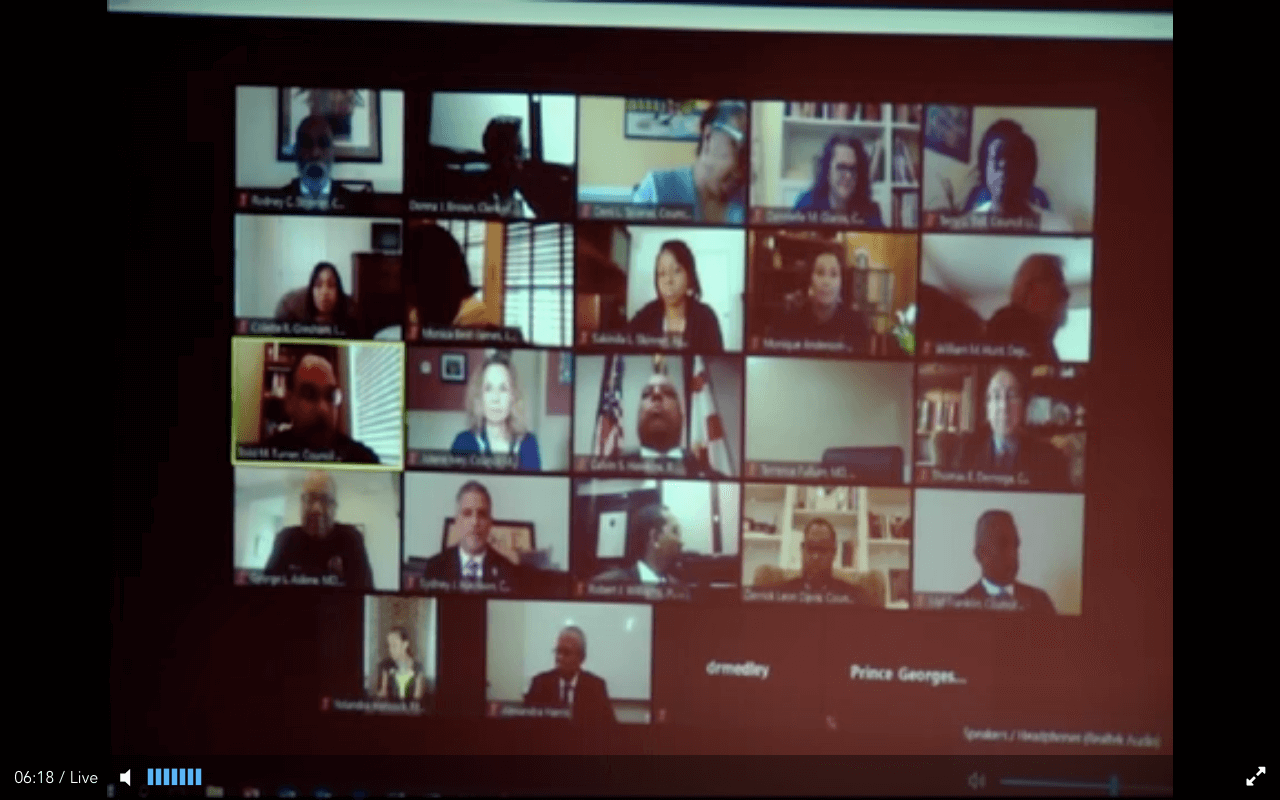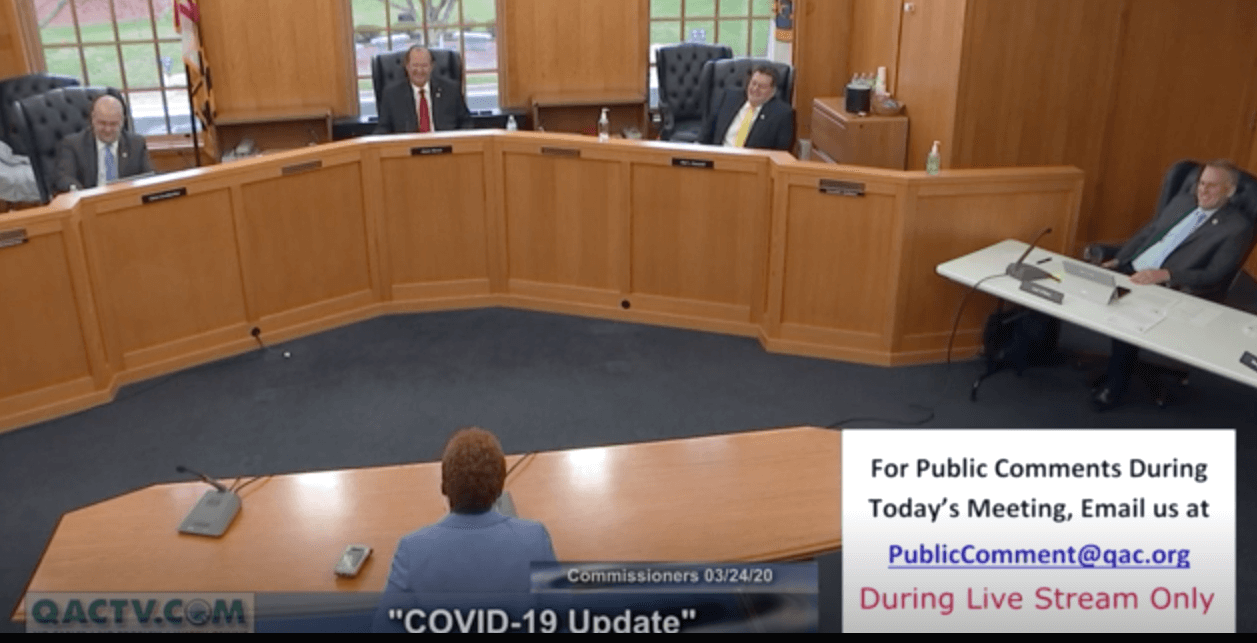Md. Governments Scramble to Move Meetings Online — And Comply With the Law

When the realization hit that they were going to have to meet online, rather than in the familiar confines of their hearing room in Upper Marlboro, members of the Prince George’s County Council quickly determined they were going to need some new equipment.
Not only did they have to bring 11 lawmakers and key staff together electronically — to comply with the state’s COVID-19-inspired ban on gatherings of more than 10 people — Council leaders needed to be able to stream the meeting live on the county’s website and record the session for residents to view later.
By no means an insurmountable task, but given that it hadn’t been done before, there was a bit of a procurement scramble to evaluate potential platforms and compare prices.
“What this pandemic has done, it’s accelerated a lot of plans for the use of technology across local governments and across the board, where people are being imaginative, re-imagining how to operate their governments or their businesses virtually,” said Scott Hancock, executive director of the Maryland Municipal League.
Like the Maryland Association of Counties, the MML has been guiding local leaders in the hurried switch to virtual meetings.
When Gov. Lawrence J. Hogan Jr. (R) declared a state of emergency last month, local governments gained the right to meet online. But their meetings still must adhere to open meetings laws: They must be advertised in advance and viewable by the public. In addition, some jurisdictions have public comment requirements that must be accommodated.
The transition is urgent. There is the normal crush of business to attend to. Most legislative bodies are receiving regular briefings on how their governments are responding to the COVID-19 crisis. Many municipalities have postponed elections. And budget season is just around the corner.
With the apparent exception of Queen Anne’s County, the vast majority of Maryland’s county and municipalities now meet online. (In Queen Anne’s, which has a five-member commission, commissioners sit several feet apart, an empty chair between them.)

Queen Anne’s County commissioners social distancing at a recent meeting. Screen grab photo from a livestream
A spot-check of a dozen recent council and commission meetings across the state found elected leaders and government attorneys adopting new policies — and explaining changes in procedures to their viewer-constituents — on the fly.
Many of the larger counties, which have more robust staff support, provide a copy of the meeting agenda in a box next to the livestream, to assist viewers in following the discussion. Smaller municipalities are more likely to have a barebones broadcast.
From the tiny town of Berwyn Heights (population 3,261) in Prince George’s County to Howard County, officials can be seen responding to the crisis in real time.
For the most part, the wheels of government have continued to turn, though at least one community’s meeting was rudely interrupted.
The tiny town of Denton on the Eastern Shore found itself the victim of hackers on April 2. According to a local media report, sites containing pornographic material popped up on the meeting site soon after the session began.
Other intruders hurled racial slurs, made derogatory remarks, screamed and played music before the moderator shut the session down.
Other public bodies that have been forced to migrate to the web have faced their own challenges.
A public conference call convened by the University System of Maryland Board of Regents last month went off the rails when numerous people — students, it is believed — yelled randomly into the session. There was no porn.
And Baltimore Mayor Bernard C. “Jack” Young (D) encountered difficulties as he presided over a virtual public meeting with his Office of Homelessness Services last Tuesday to discuss steps being taken to protect the city’s homeless population amid the pandemic.
The meeting kicked off with over three minutes of ambient noise from unmuted channels as Young repeatedly yelled the name of the office’s director, Jerrianne Anthony, hoping her voice would rise over the ocean of sound.
Even in the absence of such obvious glitches, officials acknowledge the public has less opportunity to interact with their representatives when leaders are working from home.
“It is a different feel that you don’t get to physically see and talk to people the way you normally would as an elected official, but there are still avenues,” said Prince George’s County Council Chairman Todd M. Turner (D).
“They’re still doing the work,” he said of his colleagues. “It might just be in a different way of doing it now. People still have access but it’s not obviously the same access that you might have had before.”
“That’s a challenge that everybody across the country is struggling with, and the counties have adapted,” said Alex Butler, a policy associate at Maryland Association of Counties. “They’re allowing email comments and members have been doing virtual town halls.”
Turner said the first “real test” for the Prince George’s Council will come on April 20 when the panel convenes public budget hearings for WSSC Water and the Park & Planning Commission.
“Experience is always the best guide and I think we’ll learn from this experience,” he added.
Turner said the new system may actually result in more public engagement — at least during the present public health crisis.
“I would expect we might actually get more participation because people are sheltering in place and they’re looking for things to do.”
Hannah Gaskill contributed to this report.
A NOTE TO OUR READERS
In these uncertain times, we’re here for you. We have a page dedicated to our reporting on COVID-19 in Maryland. We’ll continue to report with an eye toward the humanity of our sources and a commitment to public accountability.
Stay informed by signing up for the Maryland Matters Memo — our daily morning news roundup, delivered to your inbox. Free.
And if you are able, please consider a tax-deductible contribution to support our nonprofit newsroom.
We’re burning the candle at both ends — doing all we can to keep ourselves, and everyone else, as safe as possible — as we keep you informed.
Please take care!




 Creative Commons Attribution
Creative Commons Attribution